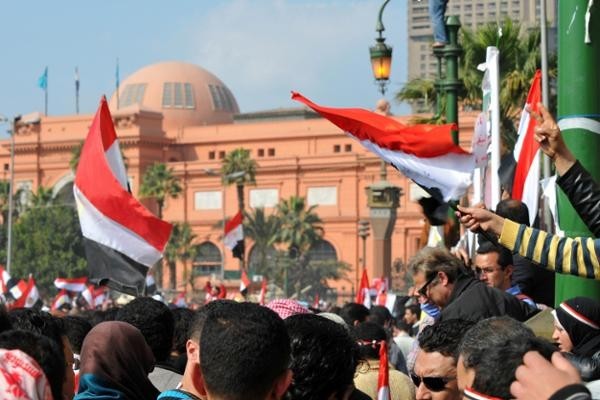*How is Islam meshing with the transition to democracy in the region?
Islam is not necessarily an obstacle to democracy. The government of the early Muslims involved consultation with a group of leaders rather than one strong-man rule. While Muslim history includes violence and conquest, the society in Medina is often referenced as an example for how Muslim governance can be compatible with democratic institutions.
The Constitution of Medina outlined some constraints on government and protections for people, and many Muslim leaders look to this era as a precedent for democracy and protection of individual liberties, including protections for non-Muslims in society. There is also a concept of itjihad in the Muslim tradition that means "reason or interpretation" that calls for Muslims to use their reason and minds to adapt to the time and place.
These historical and theological aspects of Islam are frequently used to emphasize the compatibility of Islam with democratic political institutions, but there are numerous social, economic, and political factors that push more radical interpretations of Islam that disavow democracy. What is currently happening across the Middle East has much to do with conflicts that exist outside of religion, but religion is used by people as a pretext for these power struggles.
Each country has a different dynamic and it will take time to know what post-autocratic Muslim societies and governance will look like. Islam has become the only venue for opposition to repressive rule throughout the region, and this tends to radicalize religion. If people had other organizations and institutions through which they could express their concerns, then religion would be just one of many forces in society.
Another factor affecting prospects for democracy in the region is the antagonistic relationship of the pre-dominantly Sunni Muslim countries with Shi'ite Iran, which has led to the growth of radical Islamic groups through several Persian Gulf states giving money to radical Sunni groups.
This support may haunt the Gulf states because the Islamic groups will likely turn on the monarchies of the region as their corruption and suppression of political participation is resented more and more. This again points to how suppressing secular organizations, leaving only radicalized Islamic organizations in place once repressive regimes are overthrown, makes a transition to democracy more difficult.
*Why is Egypt holding presidential elections again?
Egyptian presidential elections scheduled for May 26-27 will be the second elections held since 2011, when massive protests led by a handful of secular liberal leaders brought down three decades of autocratic rule by Hosni Mubarak.
Mubarak ruled through a repressive infrastructure with army-owned businesses, corruption, and police repression of opposition. The only outlet to voice dissent was through mosques, which Mubarak could not control. This repression increased the appeal of the Muslim Brotherhood, an Islamic social and political movement begun in 1928. For decades, Egyptian rulers have tried to suppress the Brotherhood through jailing and executing its leaders and members, and the Brotherhood engaged in acts of violence against the repressive regimes.
The 2011 protests were not led by the Muslim Brotherhood, but were the result of a handful of secular liberal leaders using social media to call people to the streets. As Mubarak's family and closest cronies had begun to hold more of the country's wealth, the army saw the need for change and told Mubarak he needed to leave power, initiating the transition to democracy.
When Mubarak was forced to leave office, the Muslim Brotherhood, albeit outlawed, was the only mass-based organization in Egyptian society. This allowed the Brotherhood to quickly form a spin-off political party and sweep the elections for parliament and the presidency. Mohamed Morsi, a leader from the Muslim Brotherhood, became the first democratically elected president of Egypt.
Even with Mubarak gone, the "deep state"

Egyptians wave their national flag in Tahrir Square in Cairo during 2011 demonstrations calling for Egyptian President Hosni Mubarak to step down. (Courtesy University of North Georgia)
http://accesswdun.com/article/2014/4/273729
